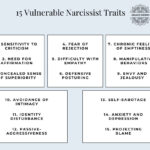How to Deal with a Narcissist | 15 Tips
Dealing with a narcissist is not a piece of cake! No matter how hard you try, it feels like you can’t get anywhere with them. And the fact that they never validate your feelings and experiences makes you feel even more frustrated.
At times you may find yourself wondering whether you’re imagining things, exaggerating, and you start questioning your sanity. They drive you CRAZY!
Whether it’s a difficult boss, a toxic friend, or even a family member, learning how to handle a narcissist can help you navigate the relationship, especially if going no contact is not an option.
In this blog post, I want to share with you 15 invaluable tips that can help you deal with a narcissist. I don’t want to mislead you, these tips won’t help you change the narcissist or ‘fix’ the relationship. But they will help you find some balance and protect yourself from their manipulative techniques.
If you’re interested in healing from narcissistic abuse, I warmly welcome you to my Narcissistic Abuse Recovery Program. It’s an easy self-paced online course which you can do at your own pace. My signature program combines scientific and spiritual tools for holistic healing of the body, mind, and spirit.
15 Tips on how to deal with a narcissist
If you’re scared that there are no possible ways of how to handle a narcissist I don’t blame you as it can seem like an impossible task, leaving you feeling frustrated and drained. But fear not, there is hope!
The below 15 tips offer the best ways to deal with narcissists. Equip yourself with the knowledge and tools necessary to navigate their challenging behaviors and protect your own well-being.
Tip 1: Practice Self-Care
Learning how to deal with a narcissist takes time and patience, and it can be extremely tiring and overwhelming.
Therefore it’s important to take care of yourself physically, mentally, emotionally and spiritually. Engage in activities that bring you joy and relaxation. Take care of your physical health through exercise, healthy eating, and enough rest.
Nurture your spiritual self through prayer, meditation, or other spiritual practices like Yin Yoga. These practices are also extremely helpful for emotional processing and releasing, as well as gaining clarity on your situation.
Related: Narcissist and Empath
Tip 2: Set Boundaries
When it comes to dealing with a narcissist, establishing clear boundaries is crucial. But how do you deal with a narcissist effectively? The key is to communicate your boundaries assertively.
Use “I” statements to express your feelings and needs, letting them know what is acceptable to you. Be firm and consistent in when setting boundaries with a narcissist and don’t hesitate to enforce consequences if they are repeatedly violated.
Remember, prioritizing your well-being and standing up for yourself is essential when navigating a relationship with a narcissist.
Tip 3: Stay Calm and Objective
Narcissists thrive on seeking narcissistic supply through manipulative techniques. It is considered one of the main characteristics on the narcissist checklist.
Staying calm and composed when you are provoked is one of the best ways to handle a narcissist. Keep your emotions in check and find healthy ways to express and release your emotions. This can be in the form of art, dance, singing, physical exercise, and somatic experiencing.
When dealing with a narcissist, stay focused on the facts and avoid getting drawn into their manipulative tactics. By remaining composed, you maintain control over the situation and prevent the narcissist from getting the reaction they desire.
Related: Narcissist Memes
Tip 4: Don’t Engage in Power Struggles
Narcissists love to be in control and manipulate others into power struggles. One of the best ways to get along with a narcissist is refusing to engage in their mind games.
Instead, assert your own independence and autonomy. Don’t let them dictate your thoughts, feelings, or actions.
Maintain your own identity and make decisions based on what is best for you, not what pleases them. Shifting your focus on what’s best for you promotes self-healing from narcissistic abuse.
Tip 5: Validate Your Own Feelings
Learning how to cope with a narcissist requires you to validate your own feelings and experiences. People who suffer from narcissism are skilled at invalidating the emotions of others.
Therefore it’s crucial to honor your own feelings and trust your instincts. Remind yourself that your emotions are valid and that you have the right to feel the way you do.
Seek validation from trusted friends, support groups, or therapists and coaches who can affirm your experiences and provide the necessary support.
Tip 6: Prioritizing Your Needs
Pay attention to this one as it’s one of the many narcissist red flags. One of the best ways to deal with narcissistic people is prioritizing your needs. Understand that narcissists will constantly seek to make you please them, but no matter how much you give, it will never be enough.
Recognize the destructive nature of people-pleasing tendencies in the context of a narcissistic relationship. The truth is, the narcissist will never make you feel good enough, and continually sacrificing your own well-being for their approval will only lead to your own detriment.
Break free from the cycle of people-pleasing and redirect your focus towards self-care, self-respect, and meeting your own needs. Remember, you deserve to prioritize yourself and your own happiness is not selfish, it’s an act of self-love.
Related: Why a Narcissist Won’t Divorce You
Tip 7: Avoid Taking Their Criticism Personally
When learning how to deal with a narcissist, it’s crucial to understand that they frequently resort to criticism and belittlement to enhance their own self-esteem.
It’s important to remember that their disparaging remarks are a reflection of their insecurities and not an accurate reflection of your worth. Resist internalizing their harsh words and refuse to let them define your self-esteem.
Instead, shift your focus towards building your own self-confidence. Surround yourself with individuals who genuinely appreciate and value you for who you are.
By prioritizing your self-worth and cultivating a supportive network, you can shield yourself from the negative impact of a narcissist’s criticism and strengthen your resilience in the face of their tactics.
Tip 8: Document Incidents and Gaslighting
Gaslighting is one of the 12 traits of a narcissist. This manipulative technique is a sign that you are dealing with a narcissist. Gaslighting makes you doubt your own perception of reality through lies, deceit, and denial.
To prevent this from happening, keep a record of incidents, conversations, and manipulative tactics used by the narcissist.
This documentation will serve as a reminder of their behavior and help you maintain your clarity when they try to distort the truth.
Tip 9: Practice Emotional Detachment
To protect yourself from the emotional turmoil caused by a narcissist, practice emotional detachment. This can be very challenging due to the nature of trauma bonding.
Trauma bonding is a complex psychological bond that forms between a victim and a narcissistic abuser, characterized by alternating cycles of abuse and intermittent reinforcement. This leads to a deep emotional attachment despite the harmful and toxic nature of the relationship.
To cope with a narcissist, recognize that their behavior is not a reflection of your worth or value. Keep a healthy distance and focus on your own well-being. Limit your emotional investment in their actions and prioritize your own happiness.
Tip 10: Educate Yourself on Narcissism
Knowledge is power when dealing with narcissism. Educate yourself on narcissistic behaviors, manipulation techniques, and the impact they can have on relationships.
Understanding the dynamics at play will enable you to respond more effectively, set healthier boundaries, and implement effective strategies on how to deal with a narcissist.
Related: Healing from Narcissistic Abuse
Tip 11: Avoid Trying to Change Them
Attempting to reason with or alter their behavior is not an effective way to treat a narcissist as this exercise is completely futile. Narcissists typically exhibit resistance to self-reflection and are seldom inclined to take responsibility for their actions.
Instead of engaging in lengthy arguments or attempting to persuade them of their wrongdoings, it is more beneficial to prioritize your own personal growth and well-being.
Rather than investing energy in trying to change an individual who is unwilling to change, redirect your focus towards self-improvement and creating a fulfilling life for yourself.
Tip 12: Surround Yourself with People Who Value You
When dealing with a narcissist, it’s essential to surround yourself with individuals who genuinely value and appreciate you.
Cultivate a supportive network of friends, family, and loved ones who understand your worth and provide a positive influence in your life. Seek out relationships that are built on mutual respect, empathy, and authenticity.
These individuals will provide a sense of validation, support, and understanding that counteracts the negative impact of the narcissistic dynamic.
By surrounding yourself with people who value you, you create a strong foundation of emotional support and reinforce your self-worth, helping you navigate the challenges of dealing with a narcissist more effectively.
Related: Signs You’re Healing From Narcissistic Abuse
Tip 13: Keep Your Expectations Realistic
One of the best ways to deal with a narcissistic person is lowering your expectations. Don’t expect a narcissist to change their core behavior.
Accept the fact that you cannot control or fix them. Instead, focus on managing your own reactions and setting healthy boundaries.
Adjust your expectations to protect yourself from disappointment and frustration.
Related: Do Narcissists Cry?
Tip 14: Consider Limiting Contact or Going No Contact
The truth is that there is no way to stop a narcissist from engaging in toxic behaviors. Narcissistic Personality Disorder (NPD) is a mental health issue listed in the Diagnostic and Statistical Manual of Mental Disorders (DSM-5). The DSM-5 is a widely recognized diagnostic tool used by mental health professionals to classify and diagnose various mental health conditions.
In some cases, limiting contact or going no contact may be the best option for your well-being. Evaluate the relationship and determine if the negative impact outweighs any potential benefits.
Establish clear boundaries or, if necessary, cut ties entirely to protect your mental and emotional health. Surround yourself with positive influences and focus on building healthy relationships!
Tip 15: Seek Professional Help if Necessary
If working on how to deal with a narcissist becomes overwhelming or starts affecting your mental health, consider seeking professional help or joining support groups for dealing with narcissists.
A therapist, coach, or counselor experienced in narcissistic abuse and dynamics can provide valuable guidance, support, and tools to help you navigate the challenges and heal from the emotional impact.
My Related Services:
–Narcissistic Abuse Recovery Program: Join a structured program that provides tools, resources, and guidance to help you navigate and heal from the impact of narcissistic abuse.
–Mindfulness Meditation Practice: Discover the power of mindfulness with me as your meditation teacher. This practice has been a transformative tool in helping me gain mental clarity, rebuild self-trust, and respond consciously rather than reacting impulsively. Book a free call today and learn how mindfulness can calm your nervous system and bring peace into your life.
–Email Advice: Get guidance, insights, and support directly to your inbox.
FAQs
Here are 15 tips on how to deal with a narcissist:
1. Practice Self-Care
2. Set Boundaries
3. Stay Calm & Objective
4. Don’t Engage in Power Struggles
5. Validate Your Feelings
6. Prioritize Your Needs
7. Don’t take Criticism Personally
8. Document Incidents
9. Practice Emotional Detachment
10. Educate Yourself on Narcissism
11. Avoid Trying to Change Them
12. Surround Yourself with People Who Value You
13. Keep Your Expectations Realistic
14. Go No Contact
15. Seek Professional Help
To shut down a narcissist, set and enforce clear boundaries, refuse to engage in their manipulations, and maintain your composure. Limit your emotional reactions, don’t take their bait, and focus on protecting your well-being.
When a narcissist can’t control you, they may become angry, defensive, or resort to other manipulative tactics. They may intensify their efforts to regain control or retaliate through aggression, gaslighting, or devaluation. Stay firm and continue prioritizing your own boundaries and well-being.
Arguing with a narcissist is often unproductive. Keep arguments brief and focused on facts, avoid personal attacks, and refuse to engage in their manipulations. Don’t expect them to change their perspective or take responsibility. Instead, prioritize your well-being and consider disengaging from arguments to protect yourself from emotional harm.
Additional Resources:
7 Stages Of Trauma Bonding
Trauma Bonding Signs
Narcissist Gaslighting
Divorcing a Narcissist






